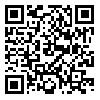Volume 10, Issue 5 (2019)
LRR 2019, 10(5): 73-100 |
Back to browse issues page
Download citation:
BibTeX | RIS | EndNote | Medlars | ProCite | Reference Manager | RefWorks
Send citation to:



BibTeX | RIS | EndNote | Medlars | ProCite | Reference Manager | RefWorks
Send citation to:
Aghajari H, Fasihi S, abbasi S. Language and Time in the Narrative of the Political Women Memoir Writers of the Pahlavi Era. LRR 2019; 10 (5) :73-100
URL: http://lrr.modares.ac.ir/article-14-30754-en.html
URL: http://lrr.modares.ac.ir/article-14-30754-en.html
1- Assistant professor- Department of History –Tarbiat Modares University –Tehran-Iran , aghajari@modares.ac.ir
2- Assistant professor- Department of History- Al Zahra University –Tehran-Iran
3- Ph.D. in Iran’s History of Islamic Era- Tarbiat Modares University –Tehran-Iran.
2- Assistant professor- Department of History- Al Zahra University –Tehran-Iran
3- Ph.D. in Iran’s History of Islamic Era- Tarbiat Modares University –Tehran-Iran.
Abstract: (6991 Views)
The significant role played by women struggling during the Pahlavi era-in shaping and accelerating the movements let to the 1979 revolution- has given them a special historical status. Awareness of this prominent position has undoubtedly been effective in getting some of them to record their life experiences in the form of autobiographies. By accepting autobiography as a way to represent self-identity and self-narration - which is based on gender – the research seeks to examine-using interpretive hermeneutic approach within the conceptual framework of Paul Ricoeur's narrative identity-on one hand the place of language and time at the level of narrative and, on the other hand, how to reflect feminine identity in narrative formats redefined in the aforesaid theory, relying on the memories of Pahlavi-era women in political arena. By recognizing the instability of identity, the study has assumed it a linguistic and temporal matter constructed by the narrators that has represented in the form of narrative, and we have made use of the most relevant theory to understand how this identity constructs. In other words, based on the conceptual framework of Paul Ricoeur's narrative identity to interpret the text of political women's memoirs, we seek to answer the following questions:
1. What place do language and time occupy at the narrative level?
2. How has feminine identity been redefined in narrative formats?
The presence of 9 women in the Left discourse and 3 women in a subgroup of Islamic ideology and the reflection of gender identity and concerns in the context of organizational identity, appropriately illustrates the dominance of the campaign discourse and organizational ideology over the female gender identity of these autobiographers, that should be considered as the data and obvious hypotheses of the study.
Of course, we are seeing that leftist militants are more explicit to represent their gender identity than Muslim militants. Narrative coherence, nonlinearity of the narrative, and the existence of a "synchronous" and "simultaneous" relationship between the time of life and the time of narration are other research results that should be noted. The continuity of story chains and the detailed description, including details of the characters involved in shaping the narrator's identity, are among other things related to the analysis of the aforementioned works. Also, the language used in the narrative is influenced by the time of the narration of the work, as in the narratives in the context of the event we see the use of slogan, emotional, and idealistic vocabulary, while in the narratives made with a temporal distance from the event, there is no place for these sentiments.
1. What place do language and time occupy at the narrative level?
2. How has feminine identity been redefined in narrative formats?
The presence of 9 women in the Left discourse and 3 women in a subgroup of Islamic ideology and the reflection of gender identity and concerns in the context of organizational identity, appropriately illustrates the dominance of the campaign discourse and organizational ideology over the female gender identity of these autobiographers, that should be considered as the data and obvious hypotheses of the study.
Of course, we are seeing that leftist militants are more explicit to represent their gender identity than Muslim militants. Narrative coherence, nonlinearity of the narrative, and the existence of a "synchronous" and "simultaneous" relationship between the time of life and the time of narration are other research results that should be noted. The continuity of story chains and the detailed description, including details of the characters involved in shaping the narrator's identity, are among other things related to the analysis of the aforementioned works. Also, the language used in the narrative is influenced by the time of the narration of the work, as in the narratives in the context of the event we see the use of slogan, emotional, and idealistic vocabulary, while in the narratives made with a temporal distance from the event, there is no place for these sentiments.
Send email to the article author
| Rights and permissions | |
 |
This work is licensed under a Creative Commons Attribution-NonCommercial 4.0 International License. |







